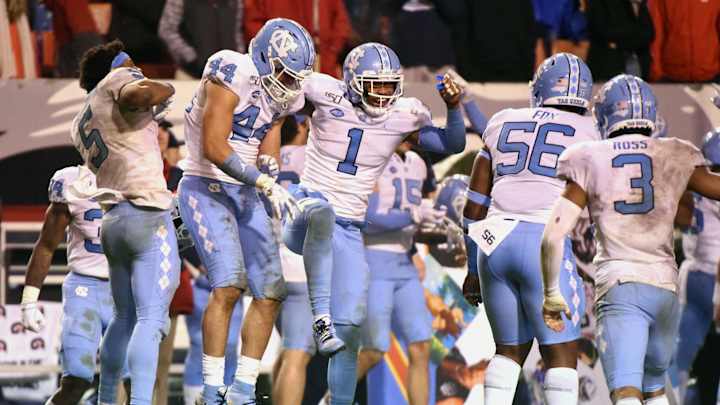Mack Brown and Bubba Cunningham on Tackling Mental Health in Football

During the month of May, Mental Health Awareness Month's purpose is to raise awareness and educate the public about mental illness and remove the stigma surrounding it. It's been in observance since 1949 by the Mental Health American Organization.
The reality of COVID-19 can be stressful for anyone, especially young adults. The loss of athletic seasons and the stress of family environment can place immense pressure on anyone - especially those who are supposed to be a way out for their family. Student-athletes who come from homes that don't have access to necessities such as nutrition, technology, and Wifi, can cause depression, anxiety and other mental illnesses that can harm their physical being and translate to their on-the-field productivity. Something no coach wants, especially if they can help it.
UNC football head coach Mack Brown and Athletic Director Bubba Cunningham are doing everything in their power to help combat mental illness not only in their student-athletes but also by extending the invitation to their family. In September of 2018, Cunningham hired former UNC standout and pro linebacker, Dwight Hollier, as Senior Associate Athletic Director for Student-Athlete Health, Well-Being, and Program Outreach.
Hollier is responsible for innovative ways to improve the physical, mental, and well-being of student-athletes. The former NFLer is a National Board Certified Counselor and Licensed Professional Counselor with extensive expertise in families, adolescents, and adults.
"Quierra, we... Bubba hired Dwight Hollier, who played for me when I was here before. And he played ten years in the NFL, and he was in counseling with the NFL, and he is in our wellness department." Brown told reporters, "And that's why we're bringing Jon Gordon in. We have a speaker once a month on Wednesday, and we call it 'Well Heeled Wednesday.'"
"So we're just constantly all over it and asking them, "Are you okay?" And our coaches are actually touching base with our players every day. Bubba used a term when we first started this that I thought really fit. And it's over-communicate. So we're trying to over-communicate with our guys just to make sure they're okay every day."
In addition to bringing on counselors, UNC administration has added monthly speakers such as former Tar Heel DB and current Carolina Panther, Tre Boston, Colt McCoy, and this month's feature, Jon Gordon.
"Jon Gordon's coming in to speak because we felt like we needed an upbeat, positive speaker. John's one of the best in the country. That's why we bring in the Wade Phillips and the Tre Bostons, and we're bringing in upbeat, positive, successful people. So these young men can see themselves being in their place like a Colt McCoy. And we're constantly talking to them about mental health."
Mental Health isn't something effortlessly identifiable, especially in those who forcefully hide it - such as kids. Speaking up about what's going through your mind can feel invasive, naked, and, at worst, make you feel like all eyes are on you like you aren't strong enough. Little do people realize that talking about your thoughts and feelings makes you stronger than you can ever imagine. Bearing your feelings can release so much tension and allow those who love you to help you carry the load. All of which reinforces that you're not in this fight alone.
"We're asking us to help us with each of them. So if they see one of their friends that's down, let us know. We've got to pick him up. We're looking at why a young man would have bad grades." Brown said, "That's a sign there's something else wrong. And there's more alcohol issues and drug issues right now with the depression and with the pandemic, people are talking about it all over the place. So it'd be foolish to think that it's not surrounding some of the people that touch our programs."
Get help. There's nothing weak about it. Mental illness can fool you into thinking that what you're experiencing is nothing, that you'll get over it or even worse if people knew what was going on with you, you'd be an outcast, but that's quite the contrary. You can be a leading example for those around you who are looking at you to make that first step. Having weak moments doesn't make you vulnerable; staying there willingly does. You have the choice to lean on your teammates and coaches, do so. Utilize every resource your college offers you to make more than an outstanding athlete but an even better human being.
For more help, please seek help at cdc.org and National Alliance on Mental Illness.
You can follow us for future coverage by clicking "Follow" on the top righthand corner of the page.
Also be sure to follow us on Twitter:
Twitter - @SI_Heels and Quierra Luck at @Quierra_Luck
